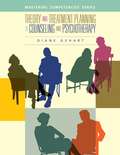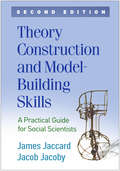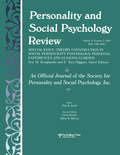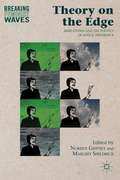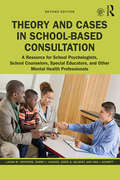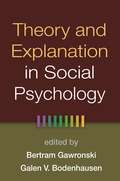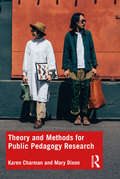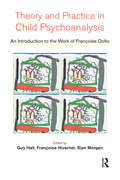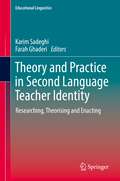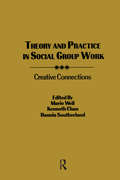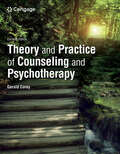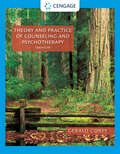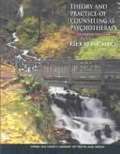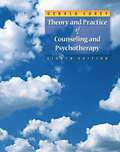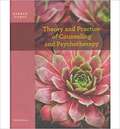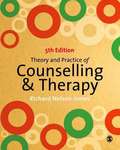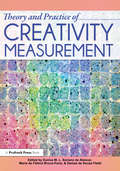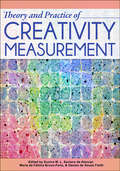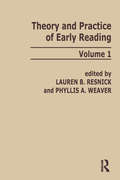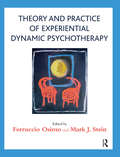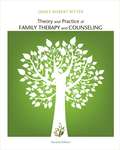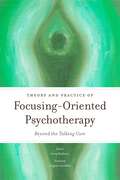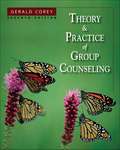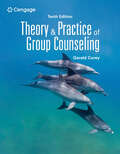- Table View
- List View
Theory And Treatment Planning In Counseling And Psychotherapy
by Diane R. GehartOne of the first books in the field of counseling to use a competency-based approach for teaching counseling and psychotherapy theories, Gehart's text has been developed to help you gain the skills and knowledge outlined in the CACREP 2009 Standards. More specifically, the text introduces counseling and psychotherapy theories using theory-informed case conceptualization as well as treatment planning. The book's assignments empower you to apply theoretical concepts and develop real-world skills as early as possible in your training, resulting in greater mastery of the material.
Theory Construction and Model-Building Skills, Second Edition: A Practical Guide for Social Scientists (Methodology in the Social Sciences)
by James Jaccard Jacob JacobyThis accessible, hands-on text has now been revised and updated, with expanded coverage of topics including how theory may emerge from exploratory data analysis. The book prepares graduate students, new researchers, and even seasoned investigators to develop their own theories and build on existing ones. Concrete strategies are provided to help readers generate ideas, define constructs, and think through relationships and processes that link constructs. Compelling examples from multiple disciplines illustrate the use of quantitative, qualitative, and mixed methods orientations to theory construction. The text also offers practical advice for writing effectively about theories in papers and grant applications. Readers learn by doing via application and concept exercises, demonstration boxes, and practical guidelines. The extensive companion website includes (www.theory-construction.com) PowerPoint slides of all of the book&’s figures, primers on advanced topics, video demonstrations, supplemental exercises, and other resources. New to This Edition *Emergent theory is now covered in mixed methods as well as qualitative approaches, plus in a new chapter on exploratory quantitative methods that can help generate new theory through data mining. *Chapter on whether and how to revise a theory when faced with disconfirmatory data. *Two chapters on the theoretical underpinnings of measurement practices. *New or expanded discussions of what constitutes a theoretical contribution, conceptual logic models, thought experiments, and more. Pedagogical Features *Application and concept exercises in every chapter. *Lists of key terms and engaging topical boxes. *Annotated suggestions for further reading. *New companion website with rich resources for students and instructors. *Chapters stand on their own and can be used in any order.
Theory Construction in Social Personality Psychology: Personal Experiences and Lessons Learned: A Special Issue of personality and Social Psychology Review
by E. Tory Higgins Arie W. KruglanskiThis special issue features papers that offer deeply felt, valuable perspectives on diverse aspects of theory construction in social-personality psychology. The goal is to furnish a basis for starting a discussion about the considerable challenges of theorizing, the ways of meeting those challenges, and the great rewards that successful theorizing offers to the discipline as a whole.
Theory On The Edge
by Margrit Shildrick Noreen GiffneyTheory on the Edge brings together some of the foremost specialists working at the interdisciplinary interface between Irish Studies, feminist theory, queer theory, and gender and sexuality studies in order to trace the contemporary development of feminist thinking and activism in Ireland.
Theory and Application of the "Generation" in International Relations and Politics
by Brent J. Steele Jonathan M. AcuffThe 'generation' has been largely forgotten in the fields of sociology and political science, especially regarding global politics. This volume re-engages the concept of a 'generation,' utilizing it to explore how it can help us understand a variety of processes and patterns in International Relations and Comparative Politics.
Theory and Cases in School-Based Consultation: A Resource for School Psychologists, School Counselors, Special Educators, and Other Mental Health Professionals
by Laura M. Crothers Jered B. Kolbert Tammy L. Hughes Ara J. SchmittThis timely second edition provides an applied perspective regarding school-based consultation, including an overview of mental health and behavioral, instructional, social cognitive, Adlerian, solution-focused, and organizational/systems consultation. With updated empirical evidence showcasing the effectiveness of consultation, this book delivers clear procedures for establishing a consultative relationship and includes case examples of problems and critical thinking questions to facilitate discussion among students and educators regarding school-based consultation. Issues of multicultural issues responsiveness, as well as ethical and legal considerations, are raised to broaden the scope of consultation stages and processes. To assist instructors in using this text, PowerPoint lectures and an instructor’s test bank are available as eResources to accompany each chapter.
Theory and Explanation in Social Psychology
by Bertram Gawronski Galen V. BodenhausenThis volume provides the first authoritative explication of metatheoretical principles in the construction and evaluation of social-psychological theories. Leading international authorities review the conceptual foundations of the field's most influential approaches, scrutinizing the range and limits of theories in various areas of inquiry. The chapters describe basic principles of logical inference, illustrate common fallacies in theoretical interpretations of empirical findings, and outline the unique contributions of different levels of analysis. An in-depth look at the philosophical foundations of theorizing in social psychology, the book will be of interest to any scholar or student interested in scientific explanations of social behavior.
Theory and Methods for Public Pedagogy Research
by Mary Dixon Karen CharmanTheory and Methods for Public Pedagogy Research introduces promising new methods of public pedagogy research centered around transforming rather than explaining knowledge. The new methods are premised on a new theorisation of public pedagogy which recognises the educative agent. The agency of the public to speak, to be heard, to know is manifest as the educative agent speaks their knowledge and the researcher must be attentive to that speaking. This work extends the well-established intellectual projects in the field to introduce four new methods for public pedagogy research: organisation, performance, curation and researcher. A key focus of this work is attending to how the circulation of knowledge in non-formal settings can be recognised. It examines the under-published area of pedagogy and research in public spaces and engages post-qualitative approaches to inquiry to open up the field. Moreover, it explores the possibility of performances, art exhibitions and museums as public spaces of knowledge generation and pedagogy. It also shows how research can be applied in practice in public pedagogy to discover best practices for working in these spaces. Finally, it confronts and critiques the dilemmas of public pedagogy research and the limits of research methods which have previously been deployed in this field. This book will be of interest to researchers and students in the field of public education and teaching in a variety of social science and arts disciplines, and education.
Theory and Practice in Child Psychoanalysis: An Introduction to the Work of Francoise Dolto
by Guy Hall Sian Morgan Françoise HivernelDuring her lifetime Francoise Dolto revolutionized the psychoanalytic understanding of childhood. As an early pioneer, she emphasized that the child is to be recognized from birth as a person. As a gifted and innovative clinician, Dolto developed her ideas about the unconscious image of the body. An image that is unique to each individual and linked to both a person's history and narcissism, rather then their physicality. It is the symbolic incarnation of a person's desires. Dolto began her career as a member of the IPA, was admired by Winnicott, close to Lacan and influenced by Morgenstern. Her life witnessed an extraordinary evolution from the conservatism of her parents, through the second World War, to the turbulence of Paris in the 1950s and 60s. In the succeeding years, Dolto made a number of original contributions to the understanding of psychosis, neonatology, female sexuality, education, and religion. Although controversial, she was able to write both for the general public and for professional colleagues.
Theory and Practice in Second Language Teacher Identity: Researching, Theorising and Enacting (Educational Linguistics #57)
by Karim Sadeghi Farah GhaderiThis book brings together the current theory, research and practical perspectives from different parts of the world on language teacher identity in an attempt to better understand the nature of identities teachers in different contexts develop. By linking theory to pedagogy, the book examines how second language teacher identities are shaped and explores the various links between teacher identities and variables that affect the formation of identities. Theory and Practice in Second Language Teacher Identity includes a foreword by Jack Richards (University of Sydney and RELC), an afterword by Peter de Costa (Michigan State University) and holds 20 invited chapters by established and active scholars and teacher educators to discuss the various aspects of in-service and pre-service second language teacher identity development. It also addresses the way the COVID-19 pandemic has impacted teacher identities and examines under-researched issues, such as the intersection between gender and race in second language teacher identity development and identity construction in second languages other than English.What does it mean to be a teacher of English as a second language in an age of globalization, new media, technological revolution and de-institutionalized knowledge? How do teachers gain pre-service and in-service expertise, a sense of professional identity, and educational integrity? And how have they dealt with the extra-burden imposed by the pandemic? This thought-provoking volume offers valuable perspectives on these important issues in the professional development of English teachers worldwide. — Prof. Claire Kramsch, University of California, Berkeley, USA.The way we see ourselves and are seen by others influences our social and professional interactions. Teacher identity and sense of agency is therefore not merely a matter of research interest for it impacts learners and learning, which makes the topic of this book extremely important. With chapters located in a wide range of countries – from USA to Australia via UAE, Thailand and others – and drawing on a variety of research methods, the book synthesizes extant research and develops many new research avenues. It does so not only with theory in mind but with practical lessons for teachers and teacher educators and thus becomes an essential volume for our libraries and studies. — Prof. Michael Byram, University of Durham, UK.In this compelling collection, co-edited by Karim Sadeghi and Farah Ghaderi, the authors address key questions about language teacher identity in contemporary applied linguistics: What is the relationship between language teacher identity and language teacher agency? To what extent does ideology impact language teacher identity? How do language teachers navigate an increasingly globalized and unequal world? Authors from different regions of the world draw on diverse methodologies to share insightful research on both pre-service and in-service language teacher identity, making an important contribution to applied linguistics and TESOL at a time of great social and educational change. — Prof. Bonny Norton (FRSC), University Killam Professor and Distinguished University Scholar, University of British Columbia, Canada.“Theory and Practice in Second Language Teacher Identity” captures recent thinking about language teacher identity. The broad array of excellent chapter contributions explores multiple dimensions of identity, from teacher agency and emotions to the disruptive effects of the Covid pandemic on teachers’ professional lives and practices. The studies draw on a number of theoretical perspectives and demonstrate the use of both familiar and innovative research methodologies. The relevant topics, the up-to-date bibliographic sources, and the useful research findings make this edited volume an essential addition to your bookshelf. — Prof. Gary Barkhuizen, University of Auckland, New Zealand.
Theory and Practice in Social Group Work: Creative Connections
by Marie Weil Kenneth L. Chau Dannia SoutherlandHere is an important look at creative ways to successfully blend theoretical knowledge with skillful intervention in social group work. Theory and Practice in Social Group Work represents leading works in conceptual development that creatively connect practice with theory and also reflect the current diversity of interventions in group work practice. The book calls for more carefully articulated connections between knowledge and action and maps a strategy for strengthening social work curriculum and expanding group work practice. Some of the areas discussed include group work in medical and health settings, group work with people undergoing life cycle transitions, and group work interventions with vulnerable populations. A wide range of possibilities for applying theories in group work situations are presented in this thought-provoking volume. Some specific examples discussed include group work interventions with persons affected by the AIDS crisis and persons at high risk of contracting HIV, a group model for the management of chronic pain, group intervention services for the homeless mentally ill delivered through a mobile outreach team, a bingo group in an SRO hotel, group work with adults molested as children, and a model of practice for work with minority populations and communities.
Theory and Practice of Counseling and Psychotherapy
by Gerald CoreyIncorporating the thinking, feeling and behaving dimensions of human experience, the Eleventh Edition of Corey's best-selling text offers an easy-to-understand guide to help you compare and contrast the therapeutic models expressed in counseling theories. This wide-ranging text provides a thorough introduction to major theories including psychoanalytic, Adlerian, existential, person-centered, Gestalt, reality, behavior, cognitive-behavior, family systems, feminist, postmodern and integrative approaches. <p><p>With his trademark style, the author also demonstrates how each theory can be applied to two cases (""Stan"" and “Gwen”), providing valuable practical insights and helping you learn to integrate the theories into an individualized counseling style. In addition, the text features engaging media resources, available through MindTap, such as case-focused videos to help bring the material vividly to life.
Theory and Practice of Counseling and Psychotherapy
by Gerald CoreyIncorporating the thinking, feeling, and behaving dimensions of human experience, the tenth edition of Corey's best-selling text helps you compare and contrast the therapeutic models expressed in counseling theories. Corey introduces you to the major theories (psychoanalytic, Adlerian, existential, person-centered, Gestalt, reality, behavior, cognitive-behavior, family systems, feminist, postmodern, and integrative approaches) and demonstrates how each theory can be applied to two cases ("Stan" and "Gwen"). He shows you how to apply theories in practice, and helps you learn to integrate the theories into an individualized counseling style. New learning objectives identify key aspects of each theory and focus your study.
Theory and Practice of Counseling and Psychotherapy (7th edition)
by Gerald CoreyThis textbook introduces Corey's (human services, California State University at Fullerton, emeritus) integrative approach to counseling, drawing from various theoretical models and applying them to different phases of the counseling process. Covering basic issues in counseling practice, theories and techniques, and integration and application, the book contains chapters on the counselor's role, ethics, psychoanalysis, Adlerian therapy, existential therapy, person-centered therapy, Gestalt therapy, behavior therapy, cognitive behavior therapy, reality therapy, feminist therapy, postmodernism, family systems therapy, the integrative perspective, and a case study. Annotation ©2004 Book News, Inc. , Portland, OR (booknews. com)
Theory and Practice of Counseling and Psychotherapy (8th edition)
by Gerald CoreyThis three parts book contains major theories of counseling (psychoanalytic, Adlerian, existential, person-centered, Gestalt, reality, behavior, cognitive-behavior, family systems, feminist and, and postmodern approaches) as they are used in practice through a case study.
Theory and Practice of Counseling and Psychotherapy 9th Edition
by Gerald CoreyThis book is intended for counseling courses for undergraduate and graduate students in psychology, counselor education, human services, and the mental health professions. It surveys the major concepts and practices of the contemporary therapeutic systems and addresses some ethical and professional issues in counseling practice. The book aims to teach students to select wisely from various theories and techniques and to begin to develop a personal style of counseling.
Theory and Practice of Counselling and Therapy
by Richard Nelson-Jones`Richard Nelson Jones'' updated edition of his compendium of 16 approaches to counselling and therapy remains a clear, concise and informative aid to both counselling trainees, practitioners of counselling skills and those who wish to gain an overview of the principles and practices most common to the therapeutic world…. [F]or anyone wanting to gain a clear idea, in a nutshell, of one or more of the main approaches, this book is invaluable'' - Therapy Today `Each chapter contains study questions, an annotated bibliography, and a list of further reading. A glossary of key terminology and an index to subject matter is included. But this is no ordinary textbook. In the words of the author, Richard Nelson-Jones, this is a ''personal journey''. This book provides an extensive, nuanced look at most of the major individual approaches to counselling and therapy to date, with all their limitations and possibilities'' - PsycCRITIQUES: APA Review of Books `This will be an informative resource to students of undergraduate and postgraduate counselling and psychotherapy courses'' - Nursing Standard (5 star review) Praise for previous editions:: `[Information] is carefully put together making it easy for trainees to get a good introduction to the central fields of Freud, Jung, Rogers, Yalom and Beck'' - The Journal of Critical Psychology, Counselling & Psychotherapy `Richard Nelson-Jones'' book has become so much a part of the counselling theory literature; it is hard to imagine discussing the topic without reference to it. This Third Edition gives testimony to its continued value. It is hard to fault this book, its readability and detailed referencing, alone, will mean that it will suit a wide readership. If you have to buy only one book on counselling and therapy, this is it'' - Professor Philip Burnard, Journal of Psychiatric and Mental Health Nursing ''An excellent summary of Rogers'' life and work and of the latest developments in person-centred therapy'' - Professor Brian Thorne, Co-founder of The Norwich Centre, Norwich `Clear, thorough and succinctly summarizes cognitive therapy''s most important concepts and principals'' - Dr Judith Beck, President, Beck Institute for Cognitive Therapy and Research, Philadelphia `The multimodal therapy chapter is a scholarly and masterful account of this orientation'' - Dr Arnold Lazarus, Distinguished Professor Emeritus of Clinical Psychology, Rutgers University, New Jersey `The reality chapter provides an excellent, accurate and updated treatment of this practical and useable method'' - Professor Robert Wubbolding, Director, Center for Reality Therapy, Cincinnati, Ohio Theory and Practice of Counselling and Psychotherapy, Fourth Edition is a comprehensive introduction to the all of the major therapeutic approaches. Written using a common structure for each approach, the book allows easy comparison between the different orientations. Each chapter provides: o an introduction to the approach o biographical information on its founder and other key figures o core theoretical concepts o the approach in practice. Key features include: o review questions designed to aid learning and revision o case material o a glossary of key terms. Written by bestselling author Richard Nelson-Jones, the Fourth Edition of this popular text features a new section on integration and eclecticism. Each chapter has been fully updated to include new developments in each approach. As a comprehensive guide to the multiplicity of therapeutic approaches, Theory and Practice of Counselling and Therapy, Fourth Edition is the ideal companion to learning for students on introductory courses and those embarking on professional training.
Theory and Practice of Creativity Measurement
by Eunice Soriano De Alencar Maria De Fatima Bruno-Faria Denise De Souza FleithTheory and Practice of Creativity Measurement explores important and fascinating topics related to the assessment of creativity. An introductory chapter provides an overview of numerous measures to assess the multiple dimensions of creativity and addresses the parameters to be considered when evaluating the quality of the available instruments, as well as the steps to be taken in their administration and interpretation. The next six chapters each describe an instrument designed to assess a variable related to creativity, such as obstacles to personal creativity, classroom climate for creativity, creativity in mathematics, and creativity strategies at the work setting. These instruments may be used in the school context or in the workplace for diagnostic purposes and for planning intervention strategies to facilitate the development and expression of the capacity to create. The book offers numerous insights that may be a source of inspiration for researchers in the area, unveiling new possibilities for promotion of creativity.
Theory and Practice of Creativity Measurement
by Maria Bruno-Faria Eunice Alencar Denise FleithTheory and Practice of Creativity Measurement explores important and fascinating topics related to the assessment of creativity. An introductory chapter provides an overview of numerous measures to assess the multiple dimensions of creativity and addresses the parameters to be considered when evaluating the quality of the available instruments, as well as the steps to be taken in their administration and interpretation. The next six chapters each describe an instrument designed to assess a variable related to creativity, such as obstacles to personal creativity, classroom climate for creativity, creativity in mathematics, and creativity strategies at the work setting. These instruments may be used in the school context or in the workplace for diagnostic purposes and for planning intervention strategies to facilitate the development and expression of the capacity to create. The book offers numerous insights that may be a source of inspiration for researchers in the area, unveiling new possibilities for research and promotion of creativity.
Theory and Practice of Early Reading: Volume 1
by Lauren B. Resnick and Phyllis A. WeaverFirst Published in 1979. Routledge is an imprint of Taylor & Francis, an informa company.
Theory and Practice of Experiential Dynamic Psychotherapy
by Ferruccio Osimo Mark J. SteinThis book provides an introduction to and history of the experiential dynamic therapies (EDT) including the ground-breaking Intensive Short-Term Dynamic Psychotherapy (ISTDP) of Habib Davanloo and its subsequent development. It also describes the essential ingredients of EDT.
Theory and Practice of Family Therapy and Counseling (Second Edition)
by James Robert BitterThis book is intended for undergraduate and graduate students interested in the fields of family therapy and family counselling. It surveys the major theories and practices of contemporary family systems and seeks to support the development of personal, professional, and ethical family practice.
Theory and Practice of Focusing-Oriented Psychotherapy: Beyond the Talking Cure
by John Amodeo Lynn Preston Judy Moore Helene Brenner Laury Rappaport Greg Madison Eugene Gendlin Akira Ikemi Pavlos Zarogiannis Sergio Lara Christiane Geiser Anna Karali Rob Parker Campbell Purton Atsmaout Perlstein Larry Letich Kevin Krycka Annmarie Early Zack Boukydis Bala Jaison Peter AffordThis comprehensive introduction to Focusing-Oriented Psychotherapy lays out the background and fundamentals of the approach covering theory and practice. Gendlin, after many articles on Focusing-oriented psychotherapy, finally published the text Focusing-Oriented Psychotherapy in 1996, making these ideas more widely available to the world. With contributions from some of the world's most influential contemporary Focusing-Oriented Psychotherapists and a foreword by Gendlin, this book provides a long overdue survey of this growing field. It explores how Focusing has been integrated with other theoretical orientations such as attachment theory, solution focused therapy, relational psychoanalysis, and existential therapy. Contemporary issues in Focusing-Oriented Psychotherapy are also covered, such as its suitability across cultures, and how it relates to the latest findings in the field of neuroscience. The book is essential reading for all practicing therapists and counselors, as well as trainee therapists, particularly those who want to explore the potential of experiential dimensions in their therapy and coaching practice. Jessica Kingsley Publishers also publishes a companion volume, Emerging Practice in Focusing-Oriented Psychotherapy: Innovative Theory and Applications, edited by Greg Madison [9781849053716].
Theory and Practice of Group Counseling
by Gerald CoreyThis text outlines the basic elements of group process, deals with ethical and professional issues of group work, and overviews the key concepts and techniques of ten approaches to group counseling. This updated sixth edition emphasizes the practical applications of the theoretical models of group work, and encourages students to develop a synthesis of these approaches. There are two new chapters on stages of group development. Corey is professor emeritus of human services at California State University.
Theory and Practice of Group Counseling
by Gerald CoreyGain an in-depth overview of the ten group counseling theories with Corey's best-selling THEORY AND PRACTICE OF GROUP COUNSELING, 10E. Using a clear, straightforward writing style, this edition illustrates how to put these theories into practice and even guides you in developing your own framework for effective group counseling with a syntheses of various aspects of the theories. New learning objectives and a consistent chapter structure help you easily grasp each theoretical concept and its relationship to group practice. This edition highlights the latest developments and most recent literature from the field with new and expanded information on accreditations, ethics and cultural sensitivity. A new video series, Group Theories in Action, provides video segments that correspond to Chapters 6-15 and bring each theory to life.
